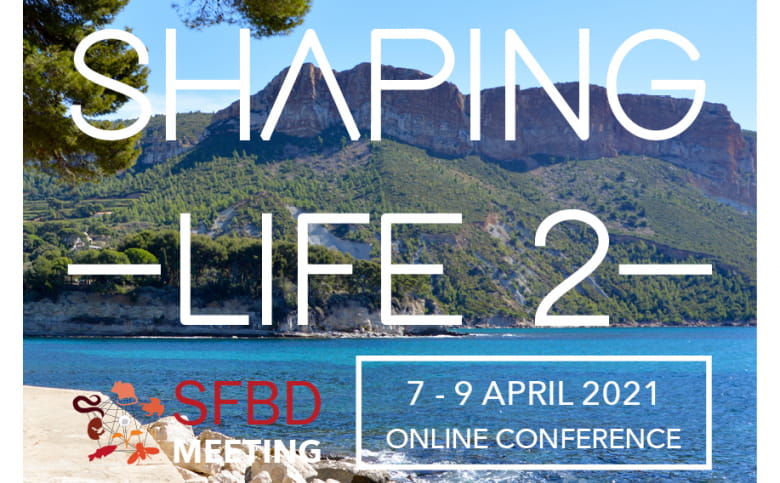Description de la soumission d'un avis

Shaping Life 2 feedbacks
From April 7th to 9th, the online conference Shaping Life, co-organized by the SFBD and the IBDM, took place. NeuroMarseille shares the feedback of NeuroSchool students who participated to this important event.
Shaping Life is a meeting organised by the French Society of Developmental Biology (SFBD) and the Developmental Biology Institute of Marseille (IBDM). This large-scale event brings together many institutional and industrial partners. NeuroMarseille/NeuroSchool is proud to contribute to the financing of this type of scientific gathering.
The second edition of this meeting, which focused on research in developmental biology, was held exclusively online. Faced with this particular context, the organisation played the innovation card with the creation of user-friendly virtual environments! An example just below!
#shapinglife2 After a day of v interesting talks and a cool poster session, it's happy hour in @gather_town with friends @MarieZilliox25 @ThomasLegier and Alex from @KodjaLab, the last speaker of the day 🎉 pic.twitter.com/sTsDRvh9zy
— Camille Dumas (@DumasCamilleE) April 8, 2021
The programme included many sessions on neuroscience!
Participants had the opportunity to listen to renowned speakers on their specialities, such as Paola Arlotta from Harvard University, who spoke on the development of the human brain, from embryos to organoids.
The #shapinglife2 on Twitter will give you a chance to relive the three days of the meeting!
#shapinglife2 @AntoineZalc asks what explains the amazing differentiation potential of cranial neural crest cells? (inc crossing germ layers > make facial mesenchyme) CNCC precursors transiently reactivate the pluripotency program with Oct4. Recent paper:https://t.co/DmhC6JPffw
— the Node (@the_Node) April 7, 2021

23 students from the PhD program were able to benefit from the funding offered by NeuroSchool
They give you their feedback on this event!
What did you like best about the meeting?
Given it was online, there was very less hinderance to interact due to availability of slack and gather town. The organisation of happy hours with games in gather town made the online format friendlier and closer to real life interactions.
The sessions of the congress that I liked more were the Martinez-Arias and Arlotta’s talks, related with development and brain organoids respectively. I knew a bit about both topics, but they were really passionate about their research that made me really interested, I learned several new techniques and very interesting experimental designs.
The information that surprised me is that I was thinking that all the brain organoids would be quite the same, but it was very interesting to know that even if they are from the same donor, depending on the place of the sample, the organoid will develop differently; as well, it was very nice to see that even if you cannot see the layers of the cortex perfectly well, there is a notion of them. Finally, something that I found amazing, is that the organoids with one mutation related with macrocephaly in humans, were indeed bigger, reflecting the use of this technique as a model to different conditions.
What was the benefit to you?
As there were two sessions of mechanics and self-organization talks, I tremendously profited from this. Given many talks were around my field of study, it helped me brainstorm more ideas and hypotheses related to my project. Also, the discussions during the poster session were beneficial for articulating conceptual ideas and experiments to better study my question in further detail.
During my thesis project I will work on single cell sequencing and during different talks I was able to notice how now this technique is being more frequently used. It was very useful to see its application on different projects and all the approaches and questions it can solve. This has helped me to reconsider and improve my experimental design.
If there was only one idea/information/advancement to remember, what would it be?
From Andrea Pauli’s talk about self-generating gradient formation, the idea of a GPCR acting as a sink for the ligand such that directional migration can be regulated. Interactions of Apelareceptor-Toddler peptide for mesoderm morphogenesis in zebrafish can be globally interpreted for ligand-receptor diffusion degradation systems.
This is the first international congress that I attend and I have to say that one of the things that I’ve found amazingly glad is to hear these huge amounts of different accents speaking in English. Science connects you everywhere!




